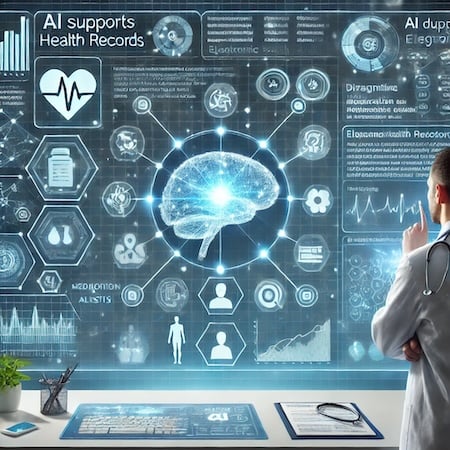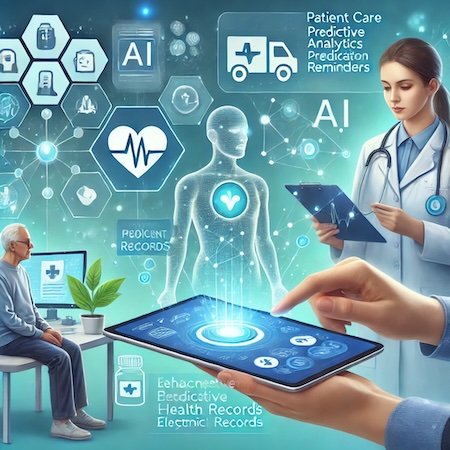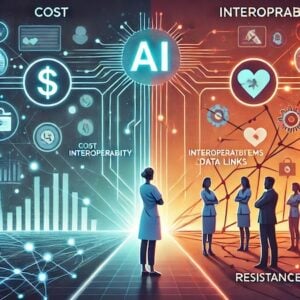“Show me an executive who isn’t tired of hearing about AI in electronic health records,” you might say. Fair enough. But here’s what your competitors aren’t telling you: most AI-EHR implementations struggle not because of technology, but due to misaligned organizational priorities and unrealistic expectations.
We’ve spent a decade guiding healthcare startups through digital transformations, and the pattern is clear: successful implementations don’t start with technology—they start with redefining clinical workflows. The most successful healthcare organizations aren’t just buying AI solutions; they’re fundamentally rethinking how their teams operate.
If you’re considering an AI-EHR investment, the insights in this guide will help you avoid the pitfalls that sink most implementations.
Key Takeaways:
- AI in EHR represents an unprecedented strategic priority: nearly 90% of healthcare executives rank digital and AI transformation as their top focus, yet most organizations lack sufficient implementation planning and resources – creating both an urgent challenge and opportunity.
- Artificial intelligence in EHR is more than an efficiency tool; it’s a major economic driver projected to save the healthcare industry up to $360 billion. This massive potential explains why early adopters are rapidly scaling their AI investments despite implementation challenges.
- AI in EMR adoption is accelerating dramatically, with usage doubling from 16% to 31% in just one year. However, legacy systems remain the second-biggest barrier to transformation after budget constraints, highlighting the need for strategic modernization approaches.
Table of Contents:
- Current State of AI in Electronic Health Records
- AI’s Role in EHR: Streamlining Processes and Reducing Errors
- Supporting Clinical Decisions with AI in EHR Systems
- Enhancing Patient Care with AI in Electronic Health Records
- Overcoming Privacy and Security Concerns in AI-Driven EHR Systems
- Challenges and Limitations of AI in EHR Implementation
- The Future of AI in Electronic Health Records
- How Topflight Can Help Integrate AI into Your EHR
Current State of AI in Electronic Health Records
The healthcare industry stands at a pivotal moment as AI in electronic health records reshapes how we handle patient data. According to a recent Deloitte study, 84% of healthcare executives believe AI will significantly transform healthcare by 2025, with EHR optimization being a primary focus area.

Looking at the market numbers, the impact is clear. The AI in healthcare market is projected to reach $45.2 billion by 2026, with EHR optimization representing roughly 25% of this growth. This surge reflects the industry’s recognition that AI isn’t just an add-on feature – it’s becoming a core component of modern healthcare delivery.
Today’s EHR and AI integration isn’t just about digitizing paper records anymore. Modern AI-based systems are turning static patient data into dynamic, actionable insights. This transformation comes at a crucial time – healthcare providers manage 50 times more data per patient than they did just five years ago, making traditional EHR software development approaches insufficient for modern healthcare demands.
The current landscape of artificial intelligence in EHR focuses on three key areas:
- Automation of routine tasks
- Enhanced clinical decision support
- Improved interoperability
Automation of Routine Tasks
Modern EHR systems leverage AI to handle time-consuming administrative work. From automated coding to smart scheduling, these systems reduce the average time spent on documentation by 6 hours per week per clinician, according to McKinsey’s 2023 healthcare report.
Also Read: Automation in Healthcare Administration
Enhanced Clinical Decision Support
AI-powered EHRs now analyze patient data in real-time, offering evidence-based recommendations during patient encounters. Did you know that diagnostic errors lead to nearly 800,000 cases of death or permanent disability each year in the U.S.?
That’s according to a 2023 Johns Hopkins study. And here’s something even more interesting: AI-powered diagnostic tools are already changing these stats by giving doctors a reliable second opinion based on analyzing millions of similar cases.
See how generative AI in pharma is revolutionizing drug discovery and clinical trials in our latest research.
Improved Interoperability
The latest AI implementations tackle healthcare’s persistent interoperability challenges head-on. By standardizing data formats and enabling smart data sharing, artificial intelligence in EHR is breaking down traditional information silos. Healthcare organizations report significant improvements in cross-system data accessibility after implementing AI-enhanced EHR solutions.
What’s particularly interesting is how these systems are evolving. Rather than replacing existing EHR infrastructure, AI augments current capabilities through strategic integration points. This approach allows healthcare providers to enhance their existing EHR investments while gradually adopting more sophisticated AI capabilities.
As we witness this transformation, one thing becomes evident: the future of healthcare technology lies at the intersection of robust EHR software development and intelligent AI integration. Organizations that recognize and act on this reality today are positioning themselves for success in tomorrow’s healthcare landscape.
Read more on healthcare app development
AI’s Role in EHR: Streamlining Processes and Reducing Errors
The integration of AI in EHR systems has introduced groundbreaking efficiencies in handling the overwhelming administrative workload in healthcare. With the increasing demand for more accurate and faster processing, healthcare organizations are leaning heavily on artificial intelligence in electronic health records to tackle tedious tasks and reduce human error, ensuring smoother operations across hospitals and clinics.

Automating Administrative Tasks
Healthcare providers have long grappled with time-consuming administrative duties, from medical coding to appointment scheduling and patient data management. AI-powered systems are transforming these workflows by leveraging technologies like robotic process automation (RPA) to handle routine processes. For example, tasks like insurance verification and claims processing, which traditionally required hours of manual work, can now be completed in minutes.
Modern AI-powered EHR systems are addressing clinician burnout by automating tedious administrative tasks. Beyond simply reducing documentation time, these systems are enabling workflows that prioritize efficiency and clarity. For instance, artificial intelligence in electronic medical records uses predictive algorithms to:
- pre-fill forms
- prioritize urgent cases
- flag anomalies.
This shift allows clinicians to spend less time on screens and more time focusing on patient care—a crucial need in today’s strained healthcare environments.
Also Read: Patient Intake Automation
Tackling Human Error in Data Entry
Errors in patient data entry can lead to serious consequences, from incorrect billing to medical complications. Artificial intelligence in electronic health records mitigates this by using AI algorithms to cross-check data for inconsistencies and flag potential errors in real-time.
For instance, if a patient’s allergy information conflicts with a prescribed medication, the system will alert the physician before the prescription is finalized, reducing the likelihood of adverse reactions.
Enhancing Workflow Efficiency
Efficiency gains from AI in EHR systems extend beyond administrative tasks. Hospitals implementing these systems report:
- streamlined workflows
- improved resource allocation
- faster turnaround times for patient care processes
For instance, appointment scheduling algorithms analyze provider availability and patient preferences, ensuring optimal utilization of resources without unnecessary delays.
AI also improves interoperability between disparate systems, enabling seamless communication across healthcare networks. This enhanced connectivity not only reduces administrative bottlenecks but also ensures that patient data is accessible and actionable when needed.
By embracing AI-powered solutions, healthcare organizations are addressing long-standing inefficiencies, cutting down on costly errors, and empowering their staff to focus on what truly matters—delivering high-quality patient care. With advancements in automation in healthcare administration, the industry is on a path toward a more streamlined, error-free future.
Related: Clinical Workflow Automation Guide
Supporting Clinical Decisions with AI in EHR Systems
AI technologies are transforming electronic health records (EHRs) from static data repositories into dynamic tools that support clinical decisions. By integrating AI for EHR, healthcare providers can leverage artificial intelligence in EMR to enhance diagnostic accuracy, improve treatment outcomes, and reduce clinician workloads. These advancements directly impact the quality of patient care and operational efficiency.

Interpreting Lab Results and Diagnoses
One of the most valuable applications of AI for EHR is its ability to process vast amounts of patient data and provide actionable insights. Machine learning algorithms can analyze lab results in real-time, identifying patterns that may go unnoticed by clinicians. This capability not only reduces diagnostic errors but also empowers physicians with reliable second opinions.
Key capabilities of AI in interpreting lab results and aiding diagnoses include:
- Flagging abnormalities in test results and correlating them with patient histories to suggest potential diagnoses.
- Condensing critical patient information into easy-to-digest formats using AI medical records summary tools, saving clinicians time and improving accuracy.
- Ensuring important factors like allergies, conditions, and current medications are factored into diagnostic processes to reduce risks.
Enhancing Clinical Decision Support Systems (CDSS)
Clinical decision support systems (CDSS) powered by AI for EHR bring real-time recommendations to the point of care. These systems integrate natural language processing (NLP) to transform unstructured notes into actionable insights, empowering clinicians to make data-driven decisions.
Notable ways AI-enhanced CDSS improves clinical workflows:
- Analyzing physician notes with NLP to extract relevant details and recommend diagnostic tests or treatment plans aligned with medical guidelines.
- Alerting clinicians to critical updates like medication protocols or allergy interactions during patient visits.
- Supporting real-time decision-making with evidence-based recommendations drawn from large datasets of patient records and clinical studies.
Read more on how to automate clinical notes.
Predicting Complications and Optimizing Treatments
Beyond diagnostics, artificial intelligence in electronic medical records excels at predicting complications before they arise. AI systems analyze longitudinal patient data to forecast risks such as drug interactions or chronic disease exacerbations. This proactive approach ensures timely interventions that improve patient outcomes and reduce hospital readmissions.
For example, predictive tools have successfully helped healthcare providers:
- Flag potential surgical risks based on patient histories and demographic data.
- Suggest alternative medications to avoid adverse drug interactions.
- Reduce hospital readmissions through tailored, proactive care plans.
In summary, AI for EHR is redefining how clinicians interact with patient data. From enhancing diagnostic accuracy to predicting complications, these systems empower healthcare providers to make informed, timely decisions that improve outcomes. Moreover, the benefits extend beyond direct patient care—AI in medical coding and billing plays a crucial supporting role, streamlining administrative tasks and allowing clinicians to focus on what truly matters: delivering exceptional care.
Enhancing Patient Care with AI in Electronic Health Records
AI technologies are transforming the way healthcare providers deliver patient care, with AI in electronic health records playing a central role in improving outcomes, ensuring better treatment adherence, and fostering proactive healthcare strategies.

By integrating EHR and AI, healthcare organizations are creating more personalized and efficient care plans, reducing the likelihood of complications, and addressing critical challenges like drug reactions and treatment adherence.
Personalized Care Plans
Modern AI-powered EHR systems enable the creation of highly personalized care plans tailored to each patient’s medical history, lifestyle, and specific needs. These systems analyze large datasets to identify patterns that guide clinicians in suggesting more effective treatment options.
- AI identifies trends in patient behavior and health outcomes, allowing healthcare providers to customize interventions.
- Predictive algorithms recommend treatment modifications based on a patient’s medical history and compliance patterns.
- Patients receive automated notifications for follow-ups and medication schedules, improving adherence.
By using these capabilities, clinicians ensure patients are more engaged in their care journeys.
Medication Tracking and Adverse Drug Reaction Alerts
One of the most critical aspects of patient care is avoiding adverse drug reactions and ensuring that patients adhere to their prescribed medications. AI in EMR tackles this challenge by using:
- advanced tracking
- alert systems
These systems monitor patients’ medication histories, cross-referencing allergies and underlying conditions to identify potential drug interactions. Clinicians and patients are notified through automated alerts about possible side effects or missed doses, ensuring timely interventions.
Additionally, predictive models analyze a patient’s current medication regimen to forecast potential complications, enabling proactive adjustments. This comprehensive approach reduces the risks associated with drug reactions while enhancing patient safety and overall treatment effectiveness.
Check out our separate guide on medication tracking app development.
Telehealth Integration for Improved Access
Telehealth has become a cornerstone of modern healthcare delivery, and integrating EHR and AI with telehealth solutions ensures seamless patient-provider interactions. Telehealth EHR integration allows AI to:
- Provide physicians with patient summaries and real-time insights during teleconsultations.
- Automate note-taking and documentation, saving clinicians valuable time.
- Enhance the quality of remote care by supporting accurate diagnoses and treatment plans.
Such integration improves access to care for remote or underserved populations, bridging the gap between patients and healthcare providers.
Conversational AI and Patient Engagement
AI-driven conversational tools are transforming how patients interact with their healthcare providers. With conversational AI in healthcare, EHR systems enable virtual assistants to handle tasks such as answering patient queries, scheduling appointments, and sending reminders. These tools also empower patients to take control of their health by managing their data and accessing records in real-time.
Furthermore, conversational AI fosters ongoing engagement by offering personalized health tips and wellness programs tailored to individual needs. By incorporating these capabilities, healthcare providers ensure patients feel supported and engaged throughout their care journeys.
| AI Feature | Key Benefit |
| Predictive algorithms | Identify potential complications before they arise |
| Medication tracking systems | Reduce missed doses and adverse drug reactions |
| Conversational AI | Improve patient engagement and health literacy |
| Telehealth integration with EHR | Enhance remote care quality and access |
AI-powered EHR systems are redefining patient care, making it more proactive, personalized, and efficient. From reducing complications to enhancing engagement, the integration of AI in electronic health records ensures that both clinicians and patients benefit from smarter, data-driven healthcare solutions.
Overcoming Privacy and Security Concerns in AI-Driven EHR Systems
As AI in EHR systems becomes increasingly integral to healthcare, ensuring privacy and security is paramount. The integration of advanced AI capabilities into electronic health records introduces new challenges, from safeguarding patient data to maintaining compliance with stringent regulations like HIPAA. Addressing these issues is essential for building trust and unlocking the full potential of artificial intelligence in EHR.

Ensuring HIPAA Compliance and Data Privacy
Healthcare organizations must prioritize compliance with HIPAA and similar regulatory frameworks to protect sensitive patient data. AI systems must be designed with robust encryption protocols, access controls, and auditing capabilities to ensure data privacy. For example, implementing AI tools that anonymize patient data before processing reduces the risk of exposure while enabling insights derived from large datasets.
To successfully navigate compliance, healthcare providers often start by evaluating their current systems during EHR implementation. AI can play a pivotal role here, identifying vulnerabilities and automating updates to meet evolving regulatory requirements.
Mitigating Security Risks with Advanced AI Tools
While AI adds complexity to healthcare systems, it also provides powerful tools for mitigating security risks. AI-driven cybersecurity measures include:
- Anomaly detection algorithms: Monitor for unusual access patterns or data transfers in real time.
- Automated threat response: Rapidly identify and isolate potential breaches.
- Predictive risk modeling: Forecast potential vulnerabilities before they can be exploited.
By incorporating these AI-based security solutions, healthcare organizations can stay ahead of emerging threats while safeguarding patient data.
Preventing Human Error Through Automation
Human error remains one of the leading causes of data breaches in healthcare. By automating routine processes, AI minimizes the potential for mistakes in data entry, access management, and record updates. For example, automating user access permissions ensures that only authorized personnel can view sensitive information, reducing the risk of accidental exposure.
When organizations choose an EHR system, they should prioritize platforms with integrated AI tools that offer these automation benefits, enabling secure and efficient operations.
Building Trust with Transparent AI Systems
To overcome privacy and security concerns, it is critical to foster trust in AI technologies. Transparent AI systems that explain their processes and decisions help build confidence among healthcare providers and patients alike. Additionally, regular audits of AI tools ensure they align with ethical standards and regulatory expectations.
While integrating AI in EHR systems presents unique challenges for privacy and security, it also offers advanced solutions to address them. By leveraging AI tools designed for compliance, automation, and cybersecurity, healthcare organizations can protect sensitive data and maintain trust in their systems.
Check out our healthcare app development services
Challenges and Limitations of AI in EHR Implementation
While AI and EHR integration is transforming healthcare delivery, it comes with significant challenges. Implementing artificial intelligence in electronic health records requires addressing hurdles like cost, interoperability, and change management to ensure smooth adoption and long-term success.

The High Cost of Implementing AI in Healthcare
One of the primary barriers to AI adoption is the cost of implementing AI in healthcare. From acquiring advanced technology to training staff and maintaining systems, the financial investment can be substantial. Small and mid-sized hospitals, in particular, may struggle to allocate resources for AI-driven EHR enhancements.
To address these challenges:
- Phased implementations are helping spread costs over time.
- Partnerships with technology providers offer scalable, modular solutions.
- Cloud-based AI tools reduce infrastructure investments.
These approaches help reduce upfront expenses while allowing healthcare systems to gradually adopt AI capabilities.
Interoperability Challenges Across Systems
Healthcare organizations often operate a mix of legacy systems and modern platforms, creating significant interoperability challenges. AI’s effectiveness depends on its ability to integrate seamlessly with existing EHR infrastructure and enable the exchange of data across disparate systems for genuine medical document automation. However, fragmented data silos and inconsistent standards can limit AI’s potential.
For instance, a hospital’s radiology department may use a system that doesn’t communicate effectively with the primary EHR, leading to inefficiencies. Overcoming this issue requires advanced AI tools designed to bridge gaps in interoperability, ensuring that all departments share consistent and actionable patient data.
Organizational Resistance and Change Management
Integrating AI and EHR systems often faces resistance from staff accustomed to traditional workflows. Physicians, nurses, and administrators may be wary of new technologies, perceiving them as complex or disruptive. To overcome this, healthcare organizations need robust change management strategies.
Key approaches include:
- Providing comprehensive training to staff on the benefits and use of AI systems.
- Highlighting how AI minimizes administrative tasks, allowing staff to focus more on patient care.
- Demonstrating early successes to build confidence in the system.
Such measures not only ease transitions but also ensure that AI tools are utilized effectively.
Balancing Innovation with Practicality
Despite its potential, AI in electronic health records must strike a balance between cutting-edge innovation and practical application. Overpromising on AI’s capabilities without addressing these challenges can lead to unmet expectations and slow adoption. By addressing EHR cost concerns, improving interoperability, and fostering organizational buy-in, healthcare providers can unlock the true value of AI-driven EHR systems.
In the journey to fully realize the benefits of AI, tackling these challenges head-on will ensure that healthcare organizations maximize efficiency and patient outcomes while overcoming barriers to implementation.
The Future of AI in Electronic Health Records
The future of AI in EHR promises to revolutionize healthcare with smarter, more efficient systems. Key trends include:
- Predictive analytics for proactive care: AI identifies health risks early, enabling preventative measures that improve outcomes and reduce readmissions.
- Generative AI in healthcare: Tools like personalized care plans and automated medical summaries save time while enhancing documentation quality.
- Medical record automation: Seamless data entry and improved interoperability ensure patient information is accessible and accurate, streamlining workflows.
These advancements highlight how electronic health records and artificial intelligence will shape a more connected and effective healthcare future.
How Topflight Can Help Integrate AI into Your EHR
Topflight brings extensive expertise in developing and implementing AI in EHR systems, enabling healthcare organizations to harness the transformative potential of artificial intelligence in EHR. Whether you’re looking to enhance clinical workflows, automate complex processes, or improve patient engagement, our solutions are tailored to meet your unique needs.

Seamless EHR Integration for Enhanced Performance
Our EHR integration services ensure that AI technologies are effectively embedded within your existing systems. By bridging gaps between disparate platforms, we enable interoperability and data fluidity, ensuring a smooth transition from traditional workflows to AI-enhanced operations. Our team prioritizes compliance with regulatory standards like HIPAA, ensuring data privacy and security throughout the process.
Proven Expertise in AI-Driven Solutions
Our portfolio includes several innovative projects that highlight our capabilities in AI and healthcare:
- Roundr: Transforming hospital workflows
We developed the Roundr hospital rounding app, integrating real-time patient insights directly into EHR systems. This solution optimized physician rounding, reduced inefficiencies, and improved patient outcomes.
- GaleAI: Automating medical coding and billing
With GaleAI, we leveraged AI to streamline medical coding processes, dramatically reducing errors and administrative burdens. The project demonstrated how automation in healthcare can improve accuracy while cutting costs.
- MiLife: Simplifying Caregiver Workflows
We developed the MiLife chatbot to streamline communication and reduce administrative burdens for caregivers. This AI-powered tool delivers real-time health recommendations, assists with care coordination, and provides timely updates for managing multiple patients. By integrating seamlessly with EHR platforms, MiLife ensures caregivers have access to accurate, up-to-date patient information, making their work more efficient and less stressful.
Tailored Solutions for Every Organization
We understand that each healthcare provider has unique challenges. That’s why we offer:
- Modular AI solutions to scale with your organization’s needs.
- Fully customizable tools designed to integrate with existing EHR platforms.
- Continuous support for implementation, staff training, and updates.
Looking to dive deeper into how AI can simplify life for providers and patients? Check out our latest ebook on using AI in EHR systems. This resource shares actionable know-how from our EHR integration and development team, based on real-life examples and available technologies. Whether you’re just starting your AI journey or refining existing processes, this ebook offers invaluable insights to guide your strategy.
At Topflight, we don’t just integrate AI in EHR systems; we craft future-ready solutions that drive efficiency, reduce costs, and enhance care delivery. Get in touch with us for a free consultation to explore how we can simplify your EHR integration and transform your healthcare delivery using AI technologies!
Frequently Asked Questions
How does AI enhanced EHR impact medical malpractice insurance rates?
Healthcare organizations with AI-powered clinical decision support in their EHRs typically see significant reductions in malpractice premiums, as insurers recognize the reduced risk of diagnostic errors and improved documentation quality.
What's the typical ROI timeline for AI-EHR investments?
Most organizations see initial ROI within the first year through administrative automation. Clinical decision support applications generally take longer to show financial returns, but deliver substantial long-term value.
How does AI-EHR integration affect physician recruitment and retention?
Healthcare organizations with modern AI-EHR systems consistently report higher physician satisfaction scores and lower turnover rates, making it a significant factor in recruitment and retention strategies.
What percentage of EHR data is typically suitable for AI training?
Most organizations find that only a portion of their existing EHR data is immediately suitable for AI training. Successful implementations typically require several months of data cleanup and standardization before deploying advanced AI features.
How does AI impact EHR system downtime?
AI-enhanced EHR systems demonstrate significantly reduced unplanned downtime compared to traditional systems, with predictive maintenance capabilities preventing potential system failures before they occur.